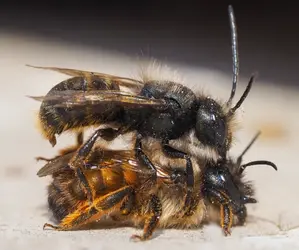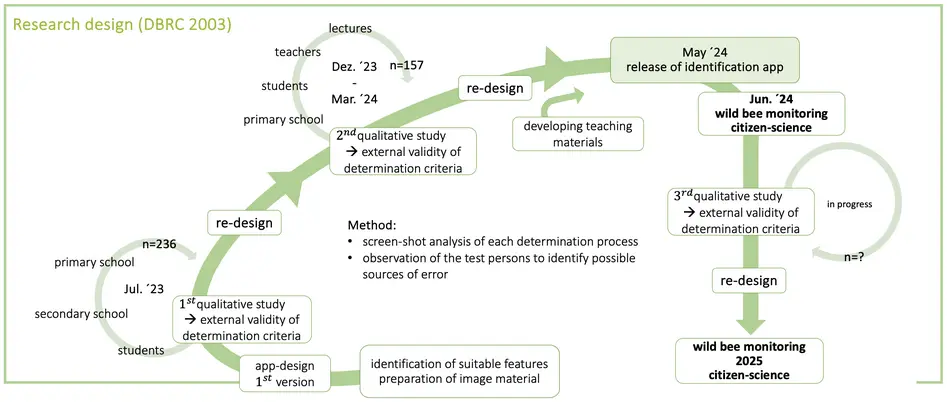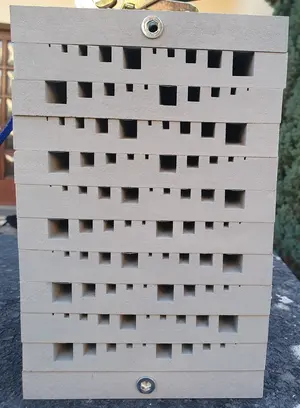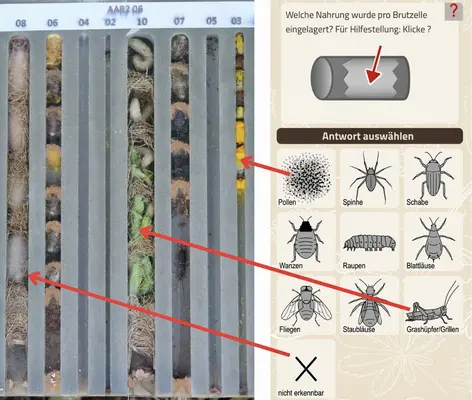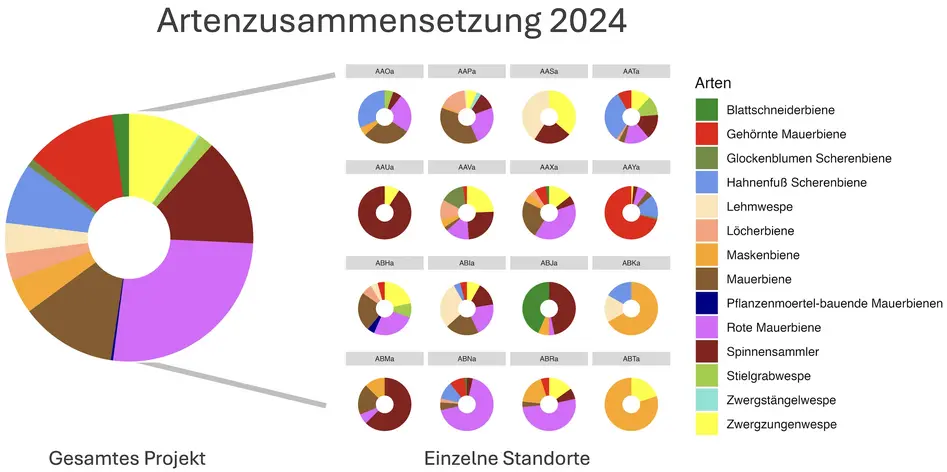DiKuLe project: Digital identification of solitary bees in nesting aids
How do solitary bees and wasps live?
What do their nests reveal about biodiversity?
How can the lifestyle and species diversity of these insects be systematically recorded?
In our project, pupils, students, teachers, and lecturers from all disciplines and types of schools work together to research the colonization of nesting aids, thereby establishing a Germany-wide monitoring system. Through the use of nesting aids, our identification app and accompanying materials, ecological relationships are made visible in a scientifically sound manner.
1. Why are solitary bees and wasps important?
Solitary bees play a key role in pollinating flowering plants due to their diversity and morphological adaptations. Unlike domesticated honey bees, solitary bees such as bumblebees and mason bees also fly during periods of bad weather. Most bees live solitarily, meaning they do not form colonies and do not produce honey. However, of the approximately 561 species of solitary bees living in Germany, around 50% are endangered (Rote Liste, 2011). Wasps are also an important part of the ecosystem, as they regulate pest insect populations as natural pest controllers.
The decline in solitary bees and wasps is largely related to changes in land use, the use of pesticides, and the associated loss of food and nesting habitats.
2. The project: Development of an identification app for participatory teaching and learning environments
At the centre of our participatory teaching and learning environment is the involvement of students and pupils in research processes using digital media. Teaching aids, combined with the specially developed species group “Solitary Bees and Wasps” in the ID-Logics identification app, offer an exciting learning environment in which pupils and students can explore essential topics in ecology. Furthermore, it enables them to get involved in the protection of solitary bees and wasps. For the first time, the identification app allows even laypeople to identify 37 typical genera and species of solitary bees and wasps based on their nests in teaching nesting aids. The identification app was programmed on the ID-Logics platform using a design-based research approach (Reinmann, 2005) and revised based on the evaluation results from two test dates (Larsen et al., 2025).
The aim is to establish Germany-wide monitoring in collaboration with students, schoolchildren, and scientific experts, which will enable long-term observation and comparison of the status of solitary bees and wasps in Germany. This will provide opportunities for first-hand experience and create learning environments conducive to research and discovery. An intensive examination of the biodiversity of solitary bees and wasps can not only deepen knowledge of species, but also lead to environmentally friendly actions in the long term in the spirit of education for sustainable development (ESD).
To this, we train (prospective) teachers and lecturers as multipliers throughout the project to enable them to implement the participatory citizen science pilot project in schools and universities in a sustainable manner with the help of the complete package provided and to carry it out with the learners. The complete package consists of nesting aids, an identification app, training opportunities, teaching materials and intensive project support from a scientific and didactic perspective. We are available to our participants at any time as personal contacts.
The DiKuLe solitary bee project is being developed in cooperation with Dr. Felix Fornoff (University of Freiburg) and the Department of Science Education at the University of Bamberg and is funded by the “Innovation in der Hochschullehre” foundation.
3. Offers for students at the University of Bamberg
Seminars
- Bee the change - understanding and protecting wild bees through social entrepreneurship in schools (summer semester 2025)
- Wonders of nature: wild bees up close! (summer semester 2024)
- Implementation in the seminar Beekeeping at schools - theory and practice of apiculture
ZA-Thesis
Possible by arrangement, please contact Sophia Hochrein (sophia.hochrein(at)uni-bamberg.de)
4. Pilot project to participate in: Citizen Science – Researching solitary bees at schools and universities
Become part of a research network with your pupils/students and work together to explore the occurrence and distribution of solitary bees and wasps in nesting aids through research-based learning. This data can be used to answer your own and joint research questions and to derive possible measures for a more biodiverse design of the site. Together, we can make a small contribution to a more sustainable society and help protect nature.
What to expect:
- Training to become multipliers through continuing education courses on solitary bees, nesting aids and didactic implementation options in teaching/instruction
- Receipt of an advanced teaching nesting aid that provides a non-invasive insight into nesting tunnels
- Learning how to use the ID-Logics identification app safely (German)
- Teaching materials (German)
- Didactic and scientific support throughout the project
- Networking and exchange among participants
- Young Researchers Conference: exchange and research format, networking
Who: (prospective) teachers of all school types, lecturers, students


